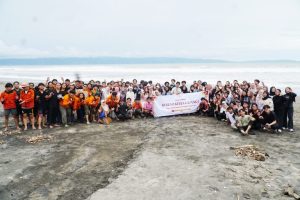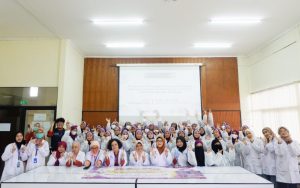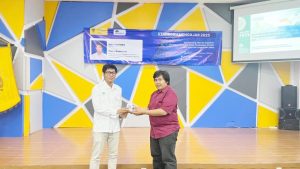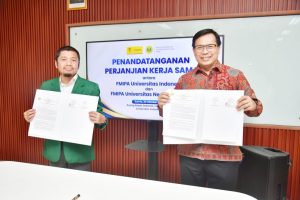|
FMIPA UI Community Service Team Develops Remote Monitoring Application to Optimize Mushroom Cultivation During the Covid-19 Pandemic

The COVID-19 pandemic did not dampen the enthusiasm of FMIPA UI lecturers and students who are members of the MIPA UI community service program team to create innovations.
The FMIPA UI microponics community service team is currently developing MikoGrow, an application that carries the Internet of Things (IoT) concept to facilitate remote monitoring, by utilizing the internet to obtain a more efficient and time-saving control system.
The use of MikoGrow, an innovation from the FMIPA UI community service team, is to optimize the results of oyster mushroom cultivation (Pleurotus ostreatus) in Bumi Kepanduan, Bojong Koneng Village, Sentul, which was initiated last year by the FMIPA UI microponics community service team together with local residents, and is now experiencing a decline in harvest yields due to the implementation of Large-Scale Social Restrictions due to Covid-19.
"The pandemic has certainly affected the limited mobility of residents and teams to meet and gather, so that the daily mushroom harvest has decreased, but we don't want to give up on the situation, we started to innovate MikoGrow which allows... monitoring "far away," said Retno Lestari as the Program Executive Chair.
Dr. Retno briefly explained how MikoGrow works. In this application, the team carries the concept of the Internet of Things, a concept that allows several electronic devices to have the ability to transfer data (control) remotely via the internet network without requiring human-to-human or human-to-computer interaction, making it easier for users to carry out remote monitoring faster.
In the mushroom house, several sensors will be installed as detectors to obtain temperature and humidity data, thus helping mushroom farmers to find out data and information on their cultivated mushrooms in real time via their Android-based devices.
From the data obtained, it will then be used as a reference by farmers to determine whether the mushrooms need to be watered or not the next day.
In fact, continued Dr. Retno, long-distance watering can also be done with a mist spray that has been placed in certain corners inside the mushroom house.
Currently, MikoGrow is still in the development stage. Dr. Retno, and the team will soon conduct socialization to mushroom farmers about the use of this technology. Through the MikoGrow application, Dr. Retno and the team hope to educate residents about the development and use of technology to support increased productivity of their mushroom cultivation efforts in the mikoponic mushroom house which accommodates 10,000 baglogs.
"Currently, MikroGrow is still in the development stage which will later be socialized to mushroom farmers. Through MikoGrow, we hope to introduce technology applications to the community and have a positive impact on the productivity of mushroom cultivation that is carried out." He added.
The FMIPA UI Community Service Team also invited residents to make various mushroom preparations that are ready to consume to increase their selling value. According to Dr. Retno, the high protein content in oyster mushrooms, coupled with their properties as immune system enhancers (immunomodulators), of course, the cultivation of these mushrooms can increase food security in fighting the COVID-19 pandemic in Indonesia.
That is the basis for the FMIPA UI Community Service Team to continue to be enthusiastic in carrying out innovations for the sustainability of the Microponics program, not only in the cultivation process, but also in product downstreaming.
Share this:
Other News




